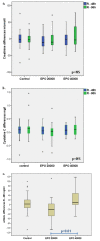Epoetin administrated after cardiac surgery: effects on renal function and inflammation in a randomized controlled study
- PMID: 23033926
- PMCID: PMC3506492
- DOI: 10.1186/1471-2369-13-132
Epoetin administrated after cardiac surgery: effects on renal function and inflammation in a randomized controlled study
Abstract
Background: Experimentally, erythropoietin (EPO) has nephroprotective as well as immunomodulatory properties when administered after ischemic renal injury. We tested the hypothesis that different doses of recombinant human EPO administered to patients after cardiac surgery would minimize kidney lesions and the systemic inflammatory response, thereby decreasing acute kidney injury (AKI) incidence.
Methods: In this double-blinded randomized control study, 80 patients admitted to the ICU post-cardiac surgery were randomized by computer to receive intravenously isotonic saline (n = 40) versus α-Epoetin (n = 40): either 40000 IU (n = 20) or 20000 IU (n = 20). The study lasted one year. The primary outcome was the change in urinary NGAL concentration from baseline and 48 h after EPO injection. Creatinine, cystatine C and urinary NGAL levels were measured on the day of randomization and 2-4 days after EPO injection. To assess acute inflammatory response, serum cytokines (IL6 and IL8) were measured at randomization and four days after r-HuEPO injection. Patients and care-takers were blinded for the assignment.
Results: No patient was excluded after randomization. Patient groups did not differ in terms of age, gender, comorbidities and renal function at randomization. The rate of AKI assessed by AKIN criteria was 22.5% in our population. EPO treatment did not significantly modify the difference in uNGAl between 48 hours and randomization compared to placebo [2.5 ng/ml (-17.3; 22.5) vs 0.7 ng/ml (-31.77; 25.15), p = 0.77] and the incidence of AKI was similar. Inflammatory cytokines levels were not influenced by EPO treatment. Mortality and hospital stays were similar between the groups and no adverse event was recorded.
Conclusion: In this randomized-controlled trial, α-Epoetin administrated after cardiac surgery, although safe, demonstrated neither nephroprotective nor anti-inflammatory properties.
Trial registration number: NCT00676234.
Figures



References
Publication types
MeSH terms
Substances
Associated data
LinkOut - more resources
Full Text Sources
Medical
Research Materials
Miscellaneous

